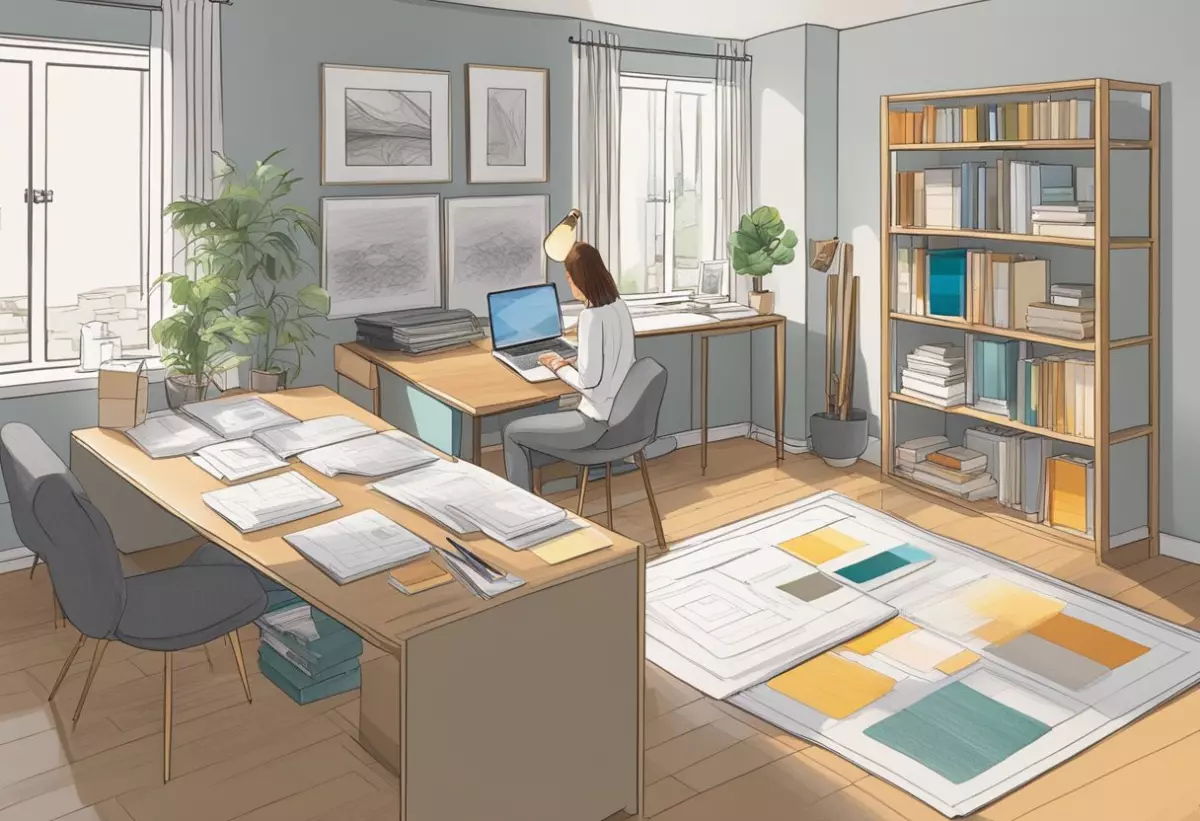Embarking on a career in interior design can feel like navigating a labyrinth without a map, especially for those without a formal degree. However, the design arena offers abundant opportunities for individuals fueled by passion and creativity. In this article, we will explore how you can thrive in interior design without a diploma, by tapping into alternative channels, nurturing essential skills, gaining practical experience, and launching your own business.
Unleashing Your Creativity and Practicality
Interior design is a multifaceted profession that requires a delicate balance between creativity and practicality to create aesthetically pleasing environments. Without a formal degree, it is crucial to cultivate an intuitive sense of design and an appreciation for the harmony of space. By immersing yourself in the world of design and staying updated on current trends and timeless techniques, you can develop a unique perspective that sets you apart.
Learning from Resources and Developing a Strong Portfolio
To further enhance your skills, you can tap into the wealth of knowledge available through industry veterans and online resources. Websites like Houzz and ArchDaily offer ample inspiration and insight into the latest trends and techniques. Additionally, platforms like Udemy and Coursera provide a treasure trove of courses, classes, and video tutorials to help you expand your knowledge.
While formal credentials are valuable, potential clients and employers often prioritize a strong portfolio over a degree. Focus on documenting your projects with before-and-after photos, detailed descriptions, and insights into your problem-solving methods. This visual narrative will showcase your ability to transform spaces and resonate with clients.
Mastering Industry Software and Gaining Practical Experience
Navigating the digital landscape is crucial in today's interior design industry. Mastering tools like AutoCAD, SketchUp, and Adobe's Creative Suite will allow you to present realistic renderings of your visions. You can acquire proficiency in these tools through dedicated training and practice. Platforms like Lynda.com offer structured tutorials that are invaluable for learning these complex software programs.
Practical experience is as valuable as formal education in the realm of interior design. Engaging in apprenticeships and seeking mentorship from industry professionals will provide you with hands-on experience and real-world insights. Volunteer work and projects for community organizations will allow you to showcase your design skills and positively impact your surroundings. Building a professional network by connecting with industry stakeholders will open doors to collaborative projects and job opportunities.
Launching Your Business with Strategic Marketing
Executing a successful launch of an interior design business without a formal education requires strategic marketing, strong client relationships, and an understanding of the legal and financial aspects of running a business. Utilize social media platforms like Instagram, Pinterest, and Houzz to showcase your work and tell a compelling story of your design philosophy. Network with local businesses and contractors to establish a referral system. Engage in targeted email campaigns to keep potential clients informed and interested.
Exceptional communication is essential in nurturing client relationships. Delve deep into your clients' needs and preferences, guiding them through the process with clear expectations and milestones. Transparency and professionalism will reassure clients and mitigate potential challenges during the project lifecycle. Ensure that all agreements with clients are formalized in written contracts, protecting both parties' interests.
Addressing the legal and financial facets of your business is crucial. Confirm if a business license is required in your area for operating an interior design business. Liability insurance and written contracts are also essential to protect yourself and your clients. Meticulous bookkeeping and an understanding of tax obligations are non-negotiables. Consider employing the services of an accountant who specializes in creative businesses to ensure financial stability.
Growing Your Career Through Continuous Learning and Specialization
Embarking on a career in interior design without a formal degree requires a proactive approach and a constant infusion of industry knowledge. Continuously pursuing educational opportunities and distinctions will help you stand out from the competition. Take advantage of trade shows and exhibitions to stay current on trends and innovations. Pursuing certifications, such as those offered by the National Council for Interior Design Qualification (NCIDQ), will establish your professionalism and enhance your reputation in the field.
Specializing in specific domains of interior design can distinguish you from others in the industry. Focus your talents on residential or commercial spaces, or explore niches like healthcare or kitchen and bath design. Expanding your client base by networking with suppliers, retail entities, and furniture artisans will attract a diverse range of projects. Effective marketing through digital platforms and social media will offer a glimpse into your unique vision and past successes.
Frequently Asked Questions
Embarking on a career in interior design without a degree can be challenging but full of potential. Here are some key inquiries for those ready to take up their design toolkit and chart their own course into the world of interior design.
Q: What are the essential skills needed to pursue interior design independently? A: To thrive in interior design, one must possess a keen eye for aesthetics, space utilization, and color coordination. Critical thinking, problem-solving skills, interpersonal skills, and business acumen are also vital. Mastery of design software is essential for unleashing creativity.
Q: Can practical experience substitute for formal education in the field of interior design? A: Yes, practical experience is often viewed as an invaluable educator in interior design. Immersing yourself in real-world projects hones your understanding of materials, client needs, and design challenges. Volunteering or internships can serve as stepping stones to professional competency.
Q: What are the steps for obtaining interior design certification without a traditional degree? A: Pursuing certification, such as the National Council for Interior Design Qualification (NCIDQ) Examination, is a recommended pathway. Research the requirements and guidelines on entities like the Council for Interior Design Qualification (CIDQ) website.
Q: How does one start and grow an interior design business with a non-academic background? A: Networking, strategic marketing, showcasing your work through social media, and nurturing strong client relationships are practical places to begin. Word-of-mouth and repeat clientele are valuable tools. Ensure compliance with local regulations, protect yourself and your clients through written contracts and liability insurance, and seek professional financial guidance.
Q: Are there specific states or regions where formal education is not a prerequisite for an interior design career? A: Yes, requirements for interior designers vary widely by location. Investigate local regulations and standards. Some states require licensing, while others have more flexible requirements. Research organizations like the American Society of Interior Designers (ASID) for additional insights about regional expectations.
Q: How important is building a portfolio when aiming to succeed as a self-taught interior designer? A: A strong portfolio is crucial for self-taught interior designers. It showcases your skills, style, versatility, and expertise to potential clients. Accumulate a range of projects that demonstrate your capabilities and communicate your brand effectively.
By following this guide and harnessing your passion, creativity, and determination, you can forge a successful career in interior design without a formal degree. Embrace alternative channels, continuously learn, gain practical experience, and never stop exploring the vast landscape of design. Your path to success starts now.
 Image Source: Saigon Intela
Image Source: Saigon Intela

















![7 Best Sites for Advertising Rental Property Listings [Free + Paid]](https://saigonintela.vn/uploads/images/blog/admin/2024/02/15/7-best-sites-for-advertising-rental-property-listings-free-paid-thumb-1707966641.webp)